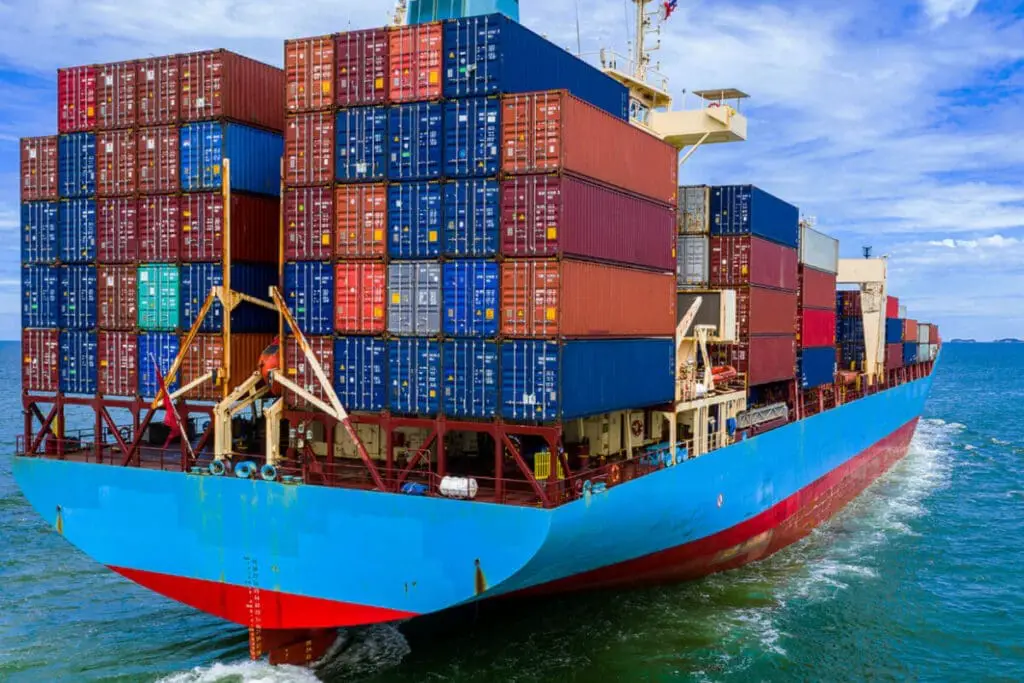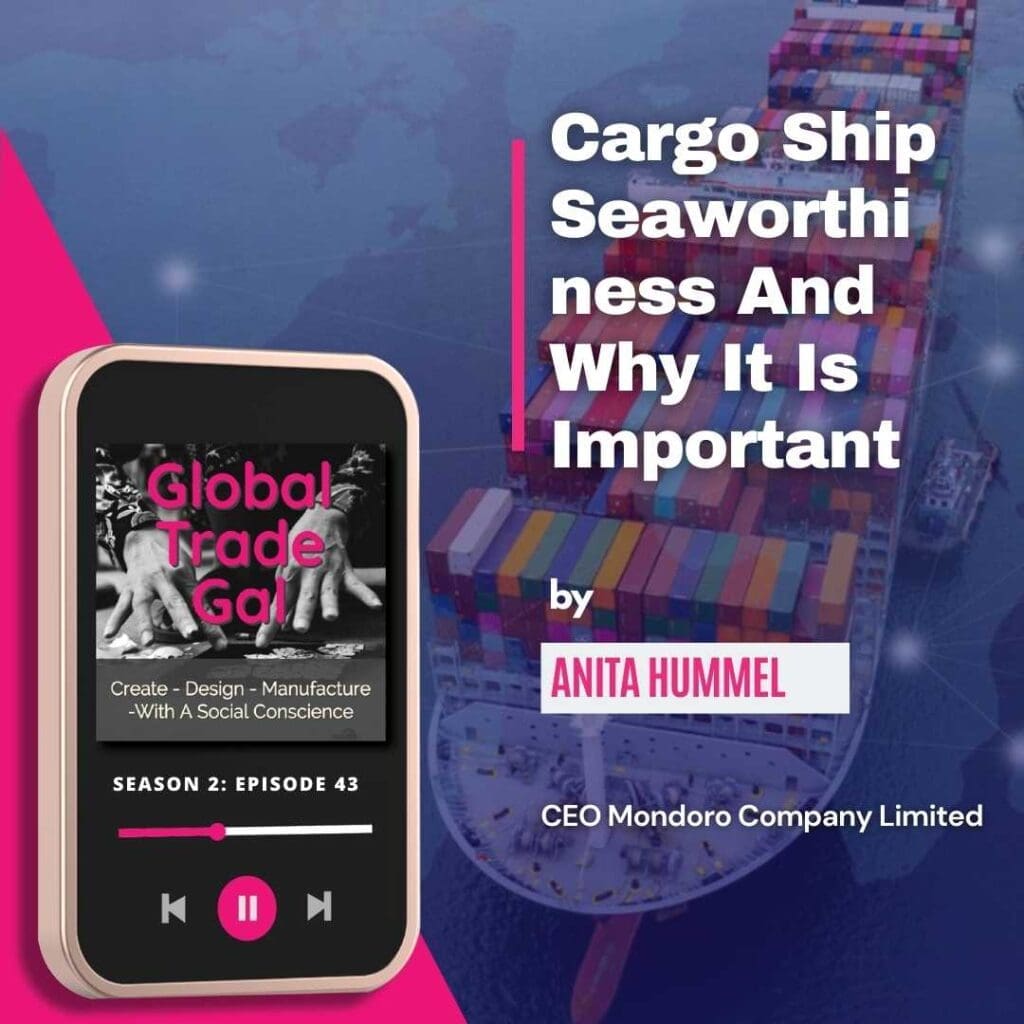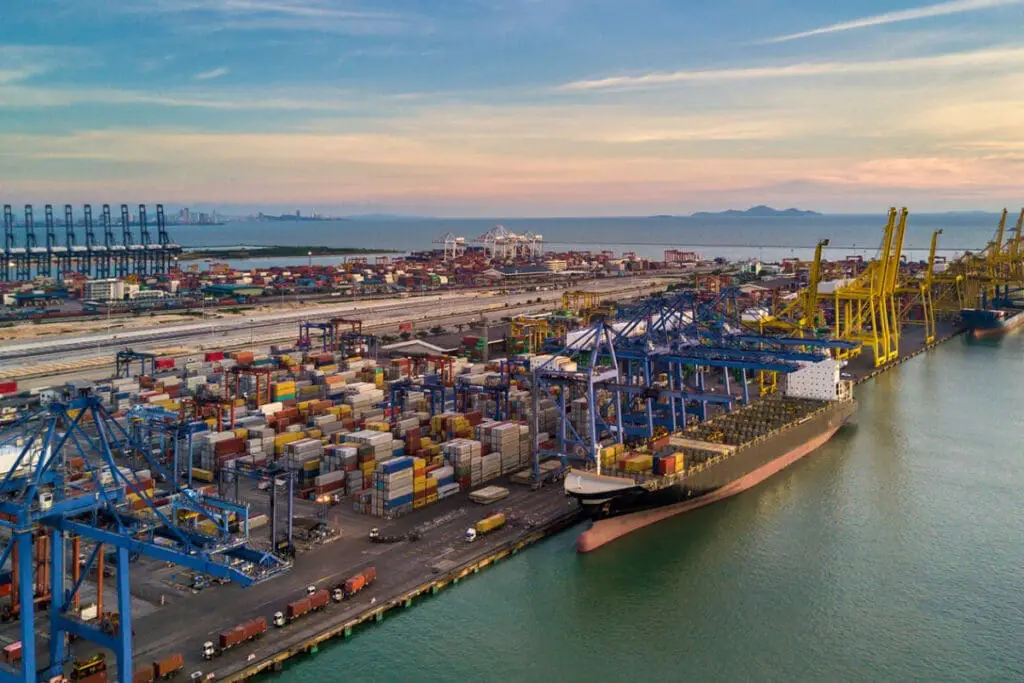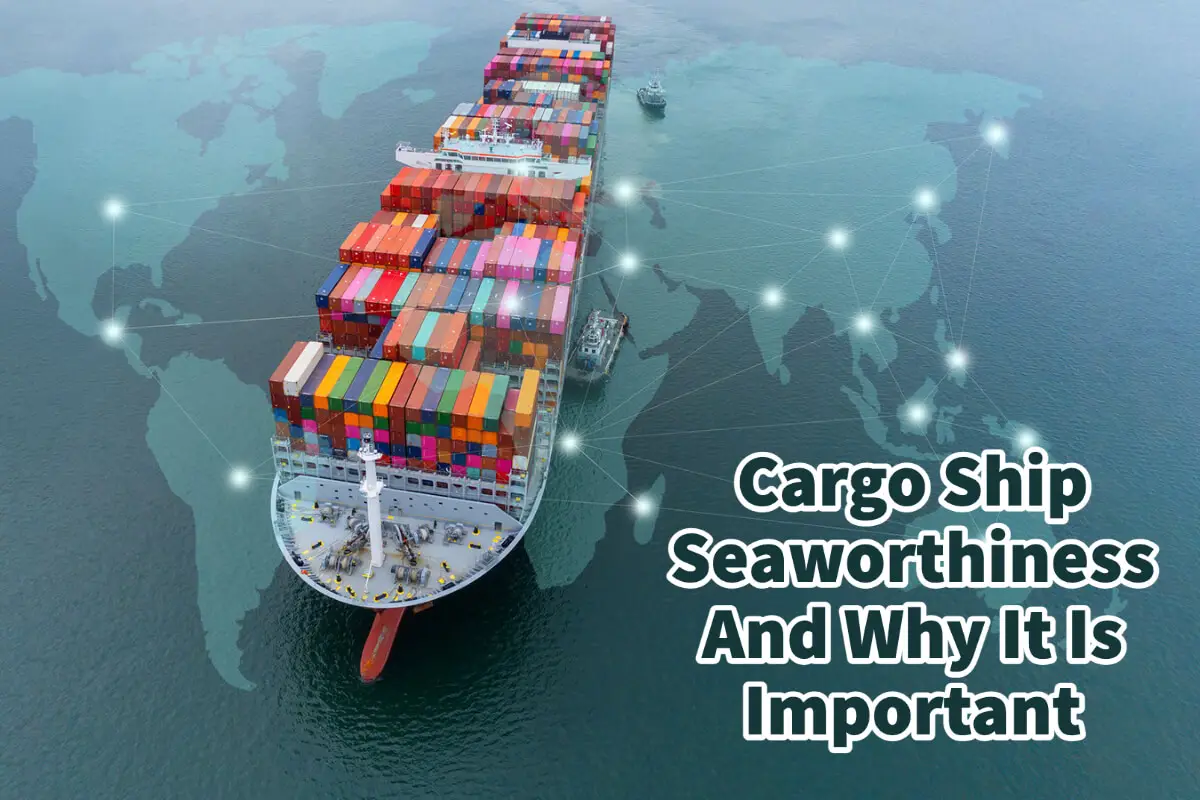Cargo ships are massive vessels that must be built to safely carry goods across the world’s waterways. But like many things, such as seaworthiness and who is a liability for damage to property or life can be pretty complicated.
Cargo ships are considered seaworthy if they can show they meet international standards for seaworthiness. As the international maritime law, the liability for a cargo ship not being constructed, maintained, or accessed to be seaworthy is very high; owners of cargo ships will ensure their boats are considered seaworthy before they start the journey.
Table of Contents
- How Is A Cargo Ship Considered Seaworthy?
- 3 Major Reasons A Cargo Ship May Not Be Seaworthy
- Cargo Ships Seaworthiness And Marine Insurance
- Frequently Asked Questions
- Related Content
How Is A Cargo Ship Considered Seaworthy?
If you are transporting your cargo across the ocean on a cargo ship, you want to know that the cargo ship it is sailing on is considered to be seaworthy. Seaworthiness classifies if avesselp has been able to pass all the safety and other requirements to classify it as seaworthy.

The seaworthiness of a cargo ship must ensure that tvesselhip adheres to the following:
- Cargo Ship Is Accessed To Be Seaworthy – The cargo ship must be accessed to be seaworthy. This means the way the boat is constructed must be able to safely handle moving across the world’s oceans.
- Cargo Ships Must Be Seaworthy Outfitted – Any cargo ship sailing across the world’s waterways must verify that the cargo ship is outfitted as seaworthy.
- Cargo Ships Must Be Maintained – The cargo ship must show that all the proper maintenance has taken place to ensure the ship is considered seaworthy.
Seaworthiness is an abstract concept in Maritime law that indicates if the cargo vessel is safe to sail.
3 Major Reasons A Cargo Ship May Not Be Seaworthy
In maritime court cases worldwide, three significant reasons are usually cited for a vessel not being seaworthy.
Here are some of the primary reasons:
- Condition Of The Vessel – In determining seaworthiness, the court will look at the condition of the vessel and if the condition of the vessel is considered to be up to the proper international standards. If the owner of the vessel does not maintain the vessel to a specific standard or they try to cut corners to save costs that affect the condition of the vessel, the owners can be held responsible for neglect for any loss of property or life.
- Vessel Construction – Vessel construction is also another factor in determining seaworthiness. If the vessel is not constructed correctly, the manufacturer can be liable for any loss of property or life.
- Lapse In Ship Maintenance – The cargo ship must also be adequately maintained, or it could affect the vessel’s seaworthiness. If the cargo ship is not maintained, the person responsible for the maintenance may have liabilities regarding loss of property or life.
All of these reasons for a loss of property or life due to a vessel not being seaworthy can fall to the owners of the vessel or the builders who build the vessels. Because this is a considerable risk for either of these parties, all major cargo ship owners will ensure that their ships meet the seaworthiness standards.

Listen To Our Podcast Cargo Ship Seaworthiness And Why It Is Important below or by clicking here.
Cargo Ships Seaworthiness And Marine Insurance
Seaworthiness is essential as it determines liability for who will pay for what if an incident involves loss of property or life. Insurance is an essential legal document that provides protection in case property or life is lost.
But marine insurance companies will also look at the seaworthiness and maintenance of the vessel to determine who is liable if there is an incident. Marine insurance agencies will want all cargo ship owners to verify that their ships have been maintained and are seaworthy.
The cargo ship can show that it did its due diligence, took care of the vessel, and maintained it up to the acceptable seaworthiness standard, then the insurance company will pay for the claim.
But if the insurance company finds that in the event of neglect or insufficient care taken by the owners that caused or led to the loss of property and life, then the owners of the cargo ship can be liable. Because of the liability a cargo ship’s owner is under, most cargo ship companies have stringent rules and procedures that ensure their cargo ships are considered seaworthy.
As the liability risks are very high for the Cargo ship owners, they will usually ensure that they follow the highest standards of maintaining their vessels to prevent any damage to the cargo they are shipping.
Because global trade is such a vast industry that has an enormous impact on not only the shipping industry but also the world’s economies, the law regarding seaworthiness and cargo ships or the carriage of goods is strictly enforced.

The law defines three significant areas that the owner of a cargo ship must ensure before a cargo ship can start its journey:
- Seaworthiness – The owner must ensure the vessel carrying the cargo is seaworthy and safe to start the journey.
- Crew And Equipment – It must be ensured that the crew and equipment are sufficient and adequately manned to operate the cargo ship safely.
- Proper Cargo Storage – The cargo ship must ensure that the way and manner the cargo is stored is safe and up to standard. The proper storage also includes things such as refrigeration units, holds, and temperature-controlled chambers that are on board the vessel.
The liability to ensure these things are up to standard is upon the ship owner to ensure the ship, crew, equipment, supplies, and handling capabilities of the cargo are up to the standard so that the cargo can be transported from port to port. The liability also extends to the ship owners ensuring that the cargo ship can safely dock at the ports.
The present Hague-Visby Rule for International Maritime law governs the carriage of goods and says that a shipowner must ensure the seaworthiness of their vessel before the beginning of the voyage. For any unforeseen causes, natural disasters, or “force majeure” occurrences, the maritime insurance company should cover any damages to property or life.
Find out more about how Mondoro can help you create, develop, and manufacture excellent home decor and furniture products – don’t hesitate to contact me, Anita. Check out my email by clicking here or become a part of our community and join our newsletter by clicking here.
Mondoro gives out a FREE Lookbook to anyone interested. You can receive a copy of our latest Lookbook by clicking here.
Listen to our Podcast called Global Trade Gal. You can find it on all major podcast platforms. Try out listening to one of our podcasts by clicking here.
Subscribe to our Mondoro Company Limited YouTube Channel filled with great videos and information by clicking here.
Frequently Asked Questions
1. What does it mean for a cargo ship to be seaworthy?
Seaworthiness refers to a cargo ship’s ability to meet international standards ensuring it is structurally sound, well-maintained, and adequately equipped for safe navigation across oceans.
2. Why is seaworthiness crucial for cargo ships?
Seaworthiness is vital to ensure the safety of the vessel, its crew, and the cargo. A seaworthy ship is less likely to encounter accidents, breakdowns, or environmental hazards during its journey.
3. What international standards govern cargo ship seaworthiness?
Various international regulations, including the International Maritime Organization (IMO) conventions, set standards for cargo ship construction, equipment, and maintenance to establish and maintain seaworthiness.
4. How is seaworthiness determined for a cargo ship?
Seaworthiness is determined through inspections and compliance with regulations related to hull integrity, engine performance, navigation equipment, safety measures, and overall operational capability.
5. What are the consequences of operating a non-seaworthy cargo ship?
Operating a non-seaworthy ship can lead to accidents, cargo damage, environmental pollution, and loss of human lives. Legal consequences, including high liabilities, fines, and potential bans on ship operations, can also arise.
6. Who is responsible for ensuring a cargo ship’s seaworthiness?
The ship’s owner is primarily responsible for ensuring the vessel’s seaworthiness. They must adhere to international standards and conduct regular inspections and maintenance to meet the requirements.
7. How often should a cargo ship undergo seaworthiness inspections?
The frequency of inspections varies, but regular inspections, including pre-voyage checks, annual surveys, and more extensive dry-dock inspections at specified intervals, are conducted to maintain seaworthiness.
8. Are there financial implications for a cargo ship not meeting seaworthiness standards?
Yes, there are significant financial implications. Liability for damages resulting from an unseaworthy ship can include compensation for cargo loss, environmental cleanup costs, legal fees, and fines imposed by authorities.
9. Can a cargo ship be denied entry to ports if it is not seaworthy?
Yes, ports and coastal authorities have the right to deny entry to a cargo ship that does not meet seaworthiness standards. This is part of global efforts to ensure maritime safety and prevent accidents in port areas.
10. How does seaworthiness contribute to sustainable shipping practices?
Seaworthy ships are less prone to accidents, reducing the risk of environmental pollution. Additionally, well-maintained vessels are more fuel-efficient, contributing to sustainable shipping practices and reducing the industry’s environmental impact.
Related Content
What Is The Difference Between Supply Chain Management and Logistics?
Supply chain management is about the collaboration and partnerships to get the goods from raw materials to the end consumer; it is about the partnerships and collaborations within this supply chain process. Logistics is one part of supply chain management; logistics is about moving goods from one place to another. The logistics providers will sometimes store the goods and send them to the end consumer.
You can learn more by reading our blog What Is The Difference Between Supply Chain Management and Logistics? by clicking here.
What Are Some Reasons to Look Towards Manufacturing Your Products in Vietnam?
With the tariffs that countries like the United States have placed on China, Vietnam is one country that has become a clear winner in the trade war. One reason is that Vietnam has a relatively large, young, educated, and skilled population. The Vietnamese Government is also business-friendly, and the country continues to develop many excellent shipping ports.
To find out more you can read 8 Reasons to Look Towards Manufacturing Your Products in Vietnam by clicking here.
Why Should You Understand the Culture of Your Product Sourcing Country?
It is important to understand the culture of the country you are sourcing and purchasing your products from. Things you can do are: 1) check a map, 2) do your homework about the place you are buying from, 3) show a genuine interest in the country and culture, 4) try to learn a few basic words of the local language, 5) see a few of the cultural sites, 6) be adventurous in trying new foods, 7) ask intelligent questions about the country and 8) find topics of conversation that will reach out across the cultural divide.
You can find out more by reading 8 Tips to Understand the Culture of Your Product Sourcing Country by clicking here.

